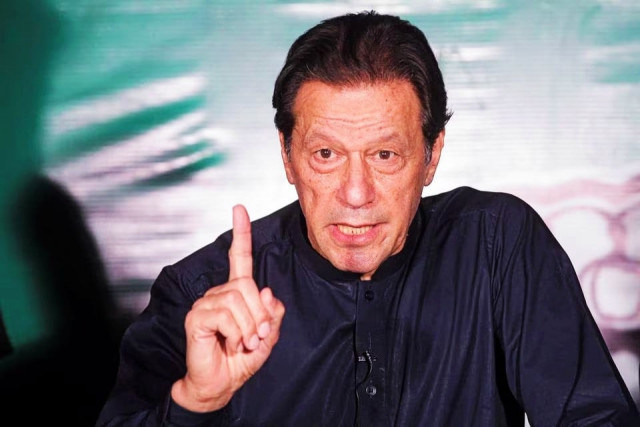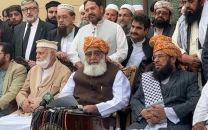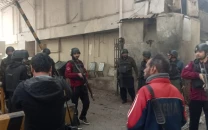ROs stump PTI as scrutiny concludes
PTI faces mass rejection of nomination papers; others get green signal

The returning officers (ROs) concluded the scrutiny of nomination papers on Saturday, stumping majority of the PTI candidates across the country by detecting errors in their papers, and clearing all those whom some might have thought would fail the scrutiny test.
It emerged on Saturday that majority of PTI candidates, who reportedly faced difficulties in submitting nomination papers in the first place, faced en masse rejection, while the bigwigs of all other parties had a smooth sailing during the scrutiny check.
As the ROs accepted nomination papers of the PML-N supremo Nawaz Sharif, founder of the Istehkam-e-Pakistan Party (IPP) Jahangir Khan Tareen – both disqualified five years ago – they rejected the papers of Pakistan Tehreek-e-Insaf founder Imran Khan on grounds of his disqualification.
The bigwigs whose nomination papers were accepted included Nawaz, Tareen, former prime minister Shehbaz Sharif, Jamiat Ulema-e-Islam-Fazl (JUI-F) chief Maulana Fazlur Rehman, Pakistan Peoples Party (PPP) Chairman Bilawal Bhutto Zardari and PPP-Parliamentarians President Asif Ali Zardari.
Similarly, papers of PPP’s former prime ministers Yousaf Raza Gilani and Raja Pervaiz Ashraf – also the National Assembly speaker – Senate Chairman Sadiq Sanjrani, PML-N Senior Vice President Maryam Nawaz, IPP’s President Aleem Khan, PTI’s Sardar Latif Khosa, former interior minister Chaudhry Nisar Ali Khan, senior politician Makhdom Javed Hashmi, MQM-P’s Farooq Sattar, former Punjab chief minister Usman Buzdar and others were also approved.
An overwhelming majority of those who faced rejection of nomination papers on various grounds included PTI candidates, including Imran Khan, Shah Mahmood Qureshi, his children Zain and Meherbano Qureshi, Chaudhry Parvez Elahi and his son Moonis Elahi, Dr Yasmin Rashid, Ali Amin Gandapur, Hammad Azhar, Murad Saeed, Ejaz Chaudhry, Atif Khan, Naeem Panjotha and others.
Following the announcement of election schedule, the Election Commission of Pakistan (ECP) received nomination papers from a total of 28,626 candidates by December 24. According to PTI officials, roughly 2,400 PTI candidates had submitted nomination papers from different constituencies.
PTI leaders said on Saturday an “overwhelming majority” of the party candidates faced rejection by December 30; the last date for scrutiny of nomination papers by ROs.
After the scrutiny, they added, the whole federal cabinet of the previous PTI government, top-tier leadership and many others met the same fate: rejection. However, those whose nomination papers got rejected can appeal at the appellate tribunals by January 3.
PTI officials said that they would challenge the decisions and; as Imran Khan put it; would fight till the last ball. The appeals will be decided upon by the appellate tribunals by January 10, followed by subsequent publication of the revised list of candidates on January 11.
Nawaz’s nomination papers were accepted from Lahore’s NA-130, with no objections raised against him. Shehbaz also had his nomination papers accepted for Lahore’s NA-123. Maryam Nawaz’s nomination papers for a provincial seat, PP-159, Lahore, were accepted, along with the papers of PML-N’s Sardar Ayaz Sadiq, Atta Tarar and Khawaja Saad Rafique.
PTI leaders Abrarul Haq and Ali Ijaz’s nomination papers were also accepted from NA-117, so as the papers of Aleem Khan of the IPP for NA-117. However, PTI leader Dr Yasmeen Rashid’s nomination papers for NA-130 were rejected, and Hammad Azhar’s papers from PP-172 faced a similar fate.
Reportedly, the nomination papers of Firdous Shamim Naqvi, Awab Alvi –son of President Dr Arif Alvi – Muzamil Aslam, Khurram Sher Zaman, Mirza Akhtar Baig were rejected from different constituencies in Karachi. Also the papers of PTI ally Sheikh Rashid were rejected from Rawalpindi.
Imran nomination papers were rejected for both NA-89m Mianwali, and NA-122, Lahore. “The candidate is convicted by the court of law and he has been disqualified under Article 63 (1)(h) of the Constitution … read with section 232 of the Election Act 2017,” the RO in NA-122 said in his order.
“The proposer of the candidate is not a registered voter in the constituency of NA-122 and hit by the section 60(1) of the Election Act 2017”, the RO also said citing the reasons for rejecting the nomination papers.
The nomination papers of PTI’s Sibtain Khan, currently the Punjab Assembly speaker, were rejected from PP-88 Mianwali. However, the RO accepted nomination papers of PTI’s senior lawyers Sardar Latif Khan Khosa and Azhar Siddique for NA-122.
PTI’s Salman Akram Raja and Shafqat Mehmood’s nomination papers for NA-128were accepted. The papers of two PTI heavyweights, Asad Qaiser, former national assembly speaker and Shahram Tarakai, former provincial minister, were also rejected by the respective ROs.
The ROs of the two National Assembly constituencies and provincial assembly constituencies issued their respective list of “validity of nominated candidates” on Saturday and names of the PTI leaders were not included in them.
However, no reason was mentioned why their names were dropped. Both Asad and Shahram have won elections in the general elections in 2013 and 2018 and were the main candidates of the PTI in the district.
Reacting to ROs’ decision, PTI Central Information Secretary Raoof Hasan criticised the rejection of the nomination papers of the PTI candidates on “flimsy grounds” and termed it the “worst interference in election process”.
He demanded of the Supreme Court to take notice of the situation. Hasan contented that the ROs’ decisions have rendered the entire electoral process questionable, thus liable to be challenged before appropriate forums, including the courts of the country.
“Besides delaying the elections, the plan re-establishes the sinister agenda of the power-wielders to keep PTI out of the parliament and pave the way for the gang of criminals to take over to unleash a reign of loot and plunder upon the country,” he maintained.
(WITH ADDITIONAL INPUTS FROM TARIQ SAEED AWAN& RANA YASIF)



















COMMENTS
Comments are moderated and generally will be posted if they are on-topic and not abusive.
For more information, please see our Comments FAQ